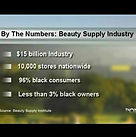
In the News.......
Be aware of the social and economic issues that directly or indirectly impact our lives. Click the pictures to access the online news story. Also, comment on these stories in our NCNW Blog Section.
As for Adrian Peterson, he will have to deal with the legal consequences of his actions. It has long been time for us to forgo violence as a disciplinary strategy. But as Chales Barkley notes, if we lock up Adrian Peterson, we could lock up every other Black parent in the South for the same behavior....
Read more about it!

What happened to Black owned Businesses?
In the Jim Crow era no bank would lend us money, no one would sell us insurance and no one would create hair care products for us.
Therefore Black entrepreneurs, who were shut out of the mainstream economy, created these kinds of businesses and employed Black people. As soon as integration became the law of the land we abandoned these businesses wholesale. And it has hurt us. Without a strong economic base no community has any leverage in this mean, cold world.
Every ethnic group in America that has been successful knows this and has had a well coordinated economic plan to become permanently viable. To lose 15 billion consumer dollars on hair care products alone is totally unacceptable. Others now provide those products and are laughing all the way to the bank.
Andrew Koonce, 15, is a talented African-American violinist from Atlanta. His list of awards and titles are impressive. As an eighth grader, he ranked first place at the Heritage Music Festival in Florida, winning the Maestro Award for best solo.
Rochelle Ballantyne
At 17, Rochelle Ballantyne is one of the top chess players in the world. This Brooklyn, N.Y., native is a high school senior now, but her name is still at the top of Intermediate School 318′s list of best players. She is on the verge of becoming the first black American female to earn the title of chess master.
One in five North Carolina families does not earn enough to afford basic necessities. The Budget & Tax Center’s Living Income Standard (LIS) for 2014 finds that a family of two adults and two children must earn more than $52,000 annually to afford food, child care, health care, transportation, and taxes. More than one-third of such families earn less than that, and more than three-fourths of those with one adult and two children fall below the standard, which varies by family size. In order to meet the LIS, adults in an average four-person family would need to earn a combined $25 an hour working full-time. Yet if current employment and industry trends continue, fewer and fewer jobs will meet this standard.
Under the official—but outmoded—federal measure of poverty, a family of four would only be classified as needy if it earned less than $23,550. However, this doesn’t take into account expenses like child care, or the fact that cost of living can vary wildly from place to place. The 2014 LIS looks at what is actually needed to make ends meet, and provides a clearer picture of the challenges faced by a growing number of North Carolinians.
Restoring the promise of well-paying jobs with benefits is one of the central challenges confronting our state. Policymakers have the tools to help create such jobs, including raising the minimum wage, ensuring that work pays for everyone by reinstating the state Earned Income Tax Credit, investing in education and skills training, and requiring taxpayer-supported jobs to meet a living income standard.
The only way North Carolina can build a strong middle class is with the ability of working families to make ends meet. Far too many are struggling as costs rise and low-wage work increases, impacting the state’s overall economy.
-
NC Justice Center: Living Income Standard 2014
-
Asheville Citizen-Times: New report shows N.C. families are struggling


